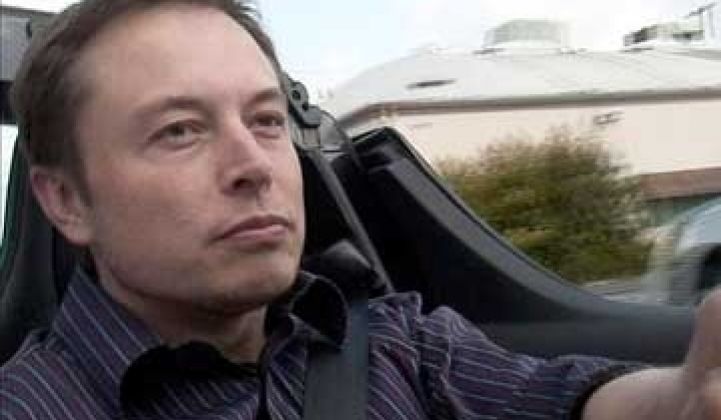Back at the beginning of the year, Tesla Motors CEO Elon Musk said he wanted the company to produce about 30 cars a week.
The company is about halfway there.
In all, Tesla has sold 937 cars through December 2009, according to the document the company filed with the Securities and Exchange Commission last week to kick off the IPO process.
In December 2008, Tesla delivered its 100th car to a customer: Sam Perry, the jovial Silicon Valley consultant who served as a shoulder to cry on for Oprah Winfrey. That means that Tesla sold 837 cars at most in 2009.
If you divide 837 by 52, you get a production output of 16 cars a week. Even if you lop two weeks off for the holidays and think about a 50-week year, you still get 16.74 cars a week.
Back in December 2008 and even in March 2009, Musk said that Tesla was producing 15 cars a week and wanted to ramp up to 30 by Spring 2009. Even if the company had hit the 30-cars-a-week barrier by July 1, the 2009 output would have come to 1170 cars, or 333 more than current output levels, in a 26-week production cycle. (Lop 45 off that figure to account for a 50-week year.) Put another way, output was nearly 40 percent lower than anticipated.
The shortfall could possibly mean two things: demand is dropping off or the production process is a little more challenging than expected. I'd personally go with production issues. The Model S, the electric sedan that is slated to make an appearance in 2012, already has a 2,000-person waiting list. Customers must also put down deposits on the company's popular Roadsters. The waiting list has been whittled down, but the company still seems to be shipping out every single car that shows up at the dealership. It doesn't even conduct final assembly until the payment is received.
The company recently switched to Panasonic to supply its batteries, and the S-1 form filed with the SEC says that Tesla now uses one source for batteries. Perhaps the earlier supplier's batteries had a glitch that caused some delays and ultimately prompted the switch to Panasonic; who knows? But we will dig into this more.
Production seemed to be going OK toward the end of the year. In late September, Tesla delivered its 700th car. That means 237 went out the doors in October, November and December. That's not a 30-a-week pace (it's 18 if you count all 52 weeks and 21.5 if you adjust for the holidays), but granted, the end of the year can be a slack time for buying.
I also might have missed some announcement adjusting these numbers, so I will take another look at that and keep you updated. Others at the company have said 20 cars a week has been closer to the goal. Ergo, the discrepancy may have just been Musk being a bit too upbeat.
Tesla Motors could not comment because it is in a quiet period.



